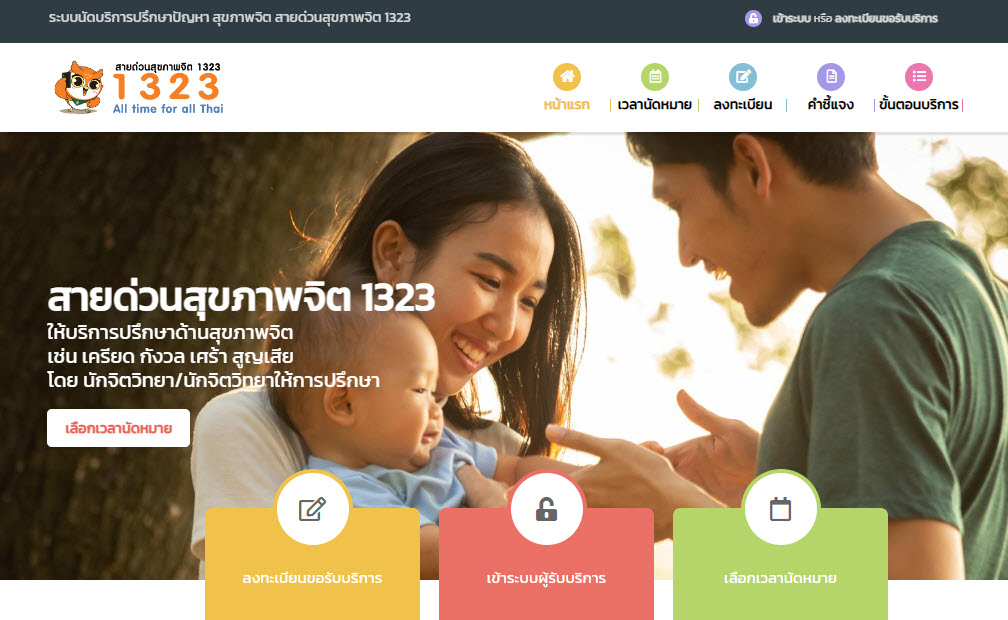
- Home
- DescriptionNews
Mental health hotline integrated into the UCS
The Ministry of Public Health, Department of Mental Health (DMH) joins hands with the National Health Security Office (NHSO) to offer Universal Coverage Scheme (UCS)’s beneficiaries access to mental health consultation via a hotline.

The number of Thais having mental health problems — especially anxiety and depression — has surged at an alarming rate in recent years.
The DMH’s survey shows more than 1.5 million people aged more than 15, or 2.2% of the Thai population, have dealt with depression.
Only 28% of them can access consultation and treatment. Many of the rest risk developing severe symptoms that can lead to other health problems and suicides.
Around 4,000 Thais end their lives each year, and many of these relate to depression.
Another survey conducted by the DMH after the COVID-19 pandemic found that depression and stress in teenagers and young adults are higher than in older Thais — putting young people at higher risk of committing suicide and self-harm actions.
Alarming suicide rates
.jpg)
Dr Wimonrat Wanpen, the Director of the Institute of Child and Adolescent Mental Health, revealed that the suicide rate had increased since the pandemic — from 6.4 to 7.3 per 100,000 population in pre- and post-pandemic, respectively.
Suicidal attempts and self-harm actions are highly reported in youth aged 15 to 19, with the suicide rate at 225 per 100,000 people.
Actions that lead to life ending are also observed in students aged five to 15, with the suicide rate at 41 per 100,000 people.
These rates are higher than people of working age (45 per 100,000 people).
The surge in mental health problems among Thais may cause by three factors, said Dr Wimonrat.
First, personal attitude toward life. Many young people are pessimistic and lack the skills to regulate emotions, leading to anxiety and depression when living in a highly-competitive society and pressure to pursue quick success.
Second, the surrounding environment. Many young people live in unpleasant families and communities without their own choices.
Some experience quarrels and violence in families or bullying at schools, forcing them to find ways to escape these every-day-life circumstances.
Third, economic and social aspects. External factors such as economic crises, prolonged pandemics, and high crime rates can frame people's perception toward their lives as hopeless and lacking meaning.
“These factors are sometimes out of any individual’s control,” said Dr Wimon.
“Getting mental health consultation promptly will help people cope with difficult situations and pass through the bad times. It will help them avoid suicides.”
Integrate hotline service
To relieve stress and anxiety, people need channels or platforms to seek advice and support.
.jpg)
The DMH has launched a 1323 Mental Health Hotline, which offers 24 hour free consultation with psychologists but its capacity is limited.
However, only 15 lines are currently available due to the DMH’s limited number of psychologists.
The waiting time could span half an hour as each consultation sessions often last more than 30 minutes. The peak time, when all lines are busy, is from 5 to 9 pm.
“Some people may hang up the phone because they can't ensure the long wait, and this could lead them to decide to end their lives,” said Dr Wimonrat.
To improve access to the hotline, the DMH has partnered with the NHSO to integrate the hotline service with the Universal Coverage Scheme (UCS) — which oversees the health of nearly 47 million Thais.
When the hospitals detect UCS beneficiaries with mental health problems and needing consultation, the health staff will refer the patients to the hotline staff — who will then call the patients and make appointments for the phone consultation sessions.
The patients are not required to pay fees as the service is covered under the UCS benefits package.
“Increasing the entry points to psychologists is very crucial. As more people are living with mental health problems now, the entry points must be various and increased in numbers,” said Dr Wimonrat.
This not only helps more people access psychologists but also, reduces the hospital crowding that prevents patients from getting high-quality mental health support.

